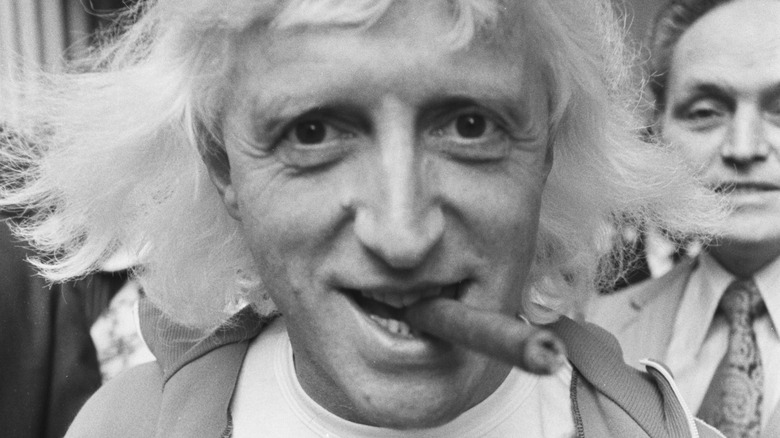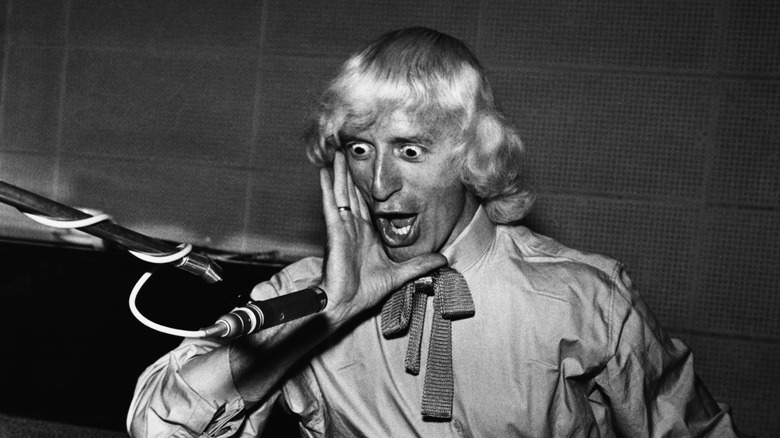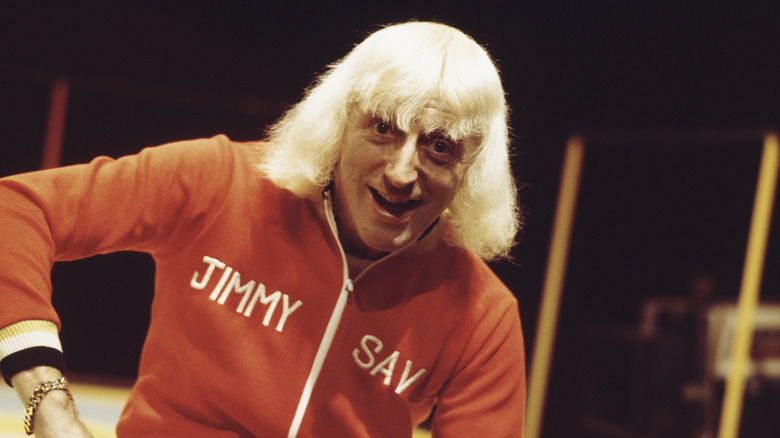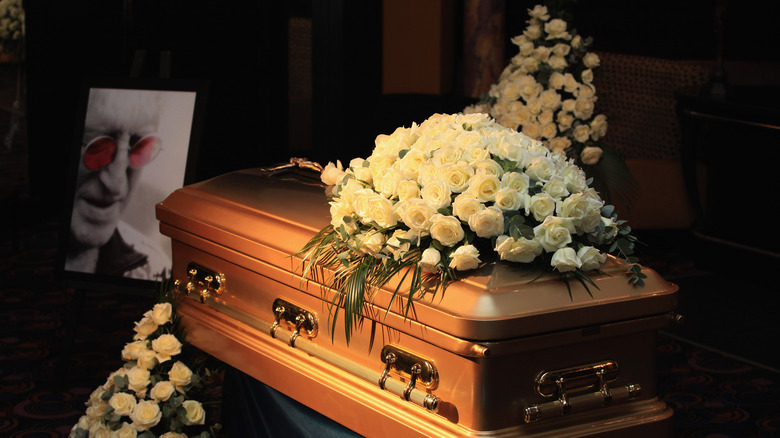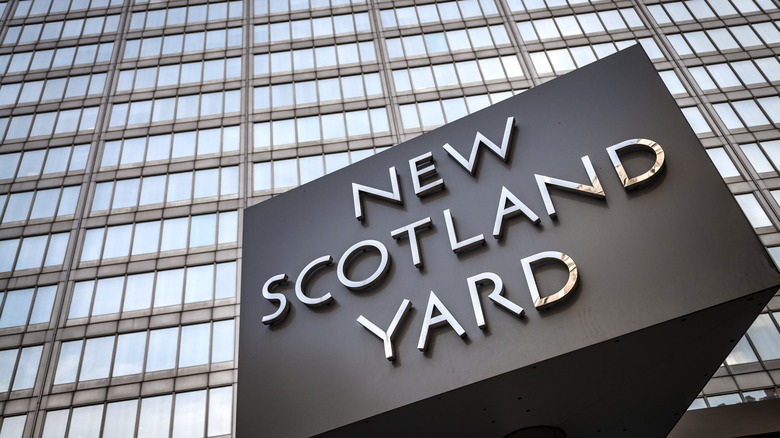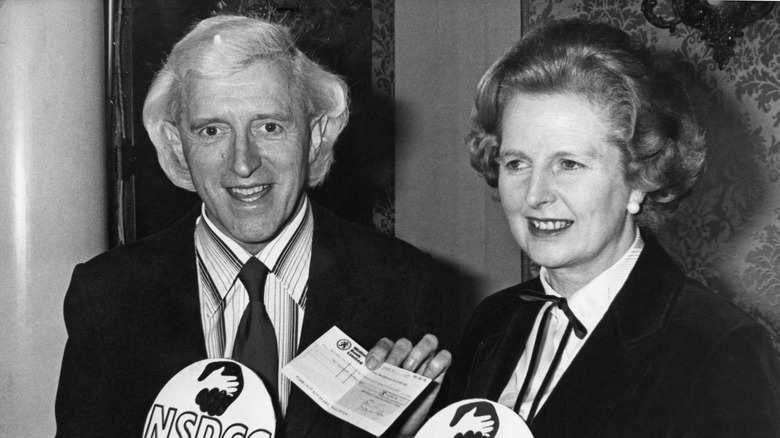How Jimmy Savile Was Able To Escape Justice For Over 60 Years
While there have been many prominent people over the years — celebrities, athletes, politicians — who have suffered a fall from grace thanks to their own, sometimes criminal, misdeeds, it's always shocking that they're able to keep these things under wraps as long as they can, despite living in the public eye. Jimmy Savile was one of those people, whose horrific crimes were happening for decades, even as he continued with his career as one of the U.K.'s most beloved television personalities. It's estimated that he raised tens of millions of pounds for charity. He was a man who hobnobbed with the Royal Family and was knighted by Queen Elizabeth in 1990, according to The U.S. Sun.
While there were whispers about his alleged misconduct — including repeated accusations of sexual assault — the truth wasn't fully revealed until after Savile died in 2011 (via The Week). The investigation became known as Operation Yewtree and while it brought Savile's crimes to light, his death meant that his victims were never able to see him face justice,
Savile's early career
James Wilson Vincent Savile was born in Leeds, England in 1926. Savile was a teenager during World War II and took a job as a miner until he was injured in an explosion. After that, he started working as the manager of a dance hall, and then made his way into broadcasting, where he really hit his stride, per Britannica.
Savile quickly became one of the most popular DJs in the country. This fame led to him hosting some Christmas shows. Paul McCartney later recalled that Savile had a habit of telling tall tales and that he was "a great entertainer." However, McCartney told The Independent that he and the rest of the Beatles "always thought there was something a little bit suspect" about Savile.
In the 1960s, Savile took the reins of one of his most well-known shows, the British music program "Top of the Pops." The show aired on the BBC and hosted many of music's biggest names over the decades, but while it served as a launching pad to stardom for some artists, Savile used it to find victims.
Early allegations of abuse
According to The Guardian, the first alleged incident of abuse occurred well before Savile was a household name in the United Kingdom. It happened in 1955, while he was still the manager of a dance hall, and had yet to hop on the radio airwaves. There were also instances of reported abuse in 1960 in which it was alleged that he sexually assaulted a young autograph seeker at the hotel where he was staying. Once he had attained a level of fame with shows like "Top of the Pops" and his later program, "Jim'll Fix It," Savile used the show as a way of gaining access to his victims.
In addition to his work on radio and television, Savile was widely known for his charity work, which included fundraising and volunteerism. While this helped cultivate an altruistic image for the famously eccentric DJ, it's now known that he used his volunteer work as a way of gaining access to his victims. This was reportedly going on as far back as the mid-1960s. In addition to hospitals, Savile was a regular presence at a girls' school in Staines, Surrey. Once again, it's said, he used this opportunity to perpetrate abuse,
If you or anyone you know has been a victim of sexual assault, help is available. Visit the Rape, Abuse & Incest National Network website or contact RAINN's National Helpline at 1-800-656-HOPE (4673).
Suspicions increased just before Savile's death
Savile died on October 29, 2011, at home in Leeds. In the years leading up to his death, the rumors about Savile's personal life and crimes had ramped up, so much so that in 2009, he was interviewed by police as part of an investigation into incidents that had occurred at Duncroft school, the girl's school where he was seen frequently. However, it was deemed that there wasn't enough evidence for the investigation to continue at the time.
As tributes poured in from Savile's fans — his former employer, the BBC, even aired a special paying tribute to him — so to do did more allegations of abuse, including one that allegedly occurred in the 1970s (via The Guardian). Police said that they had investigated "a historic allegation of indecent assault ... alleged to have occurred at a children's home in Staines in the 1970s," and that they had turned the case over to the Crown Prosecuting Service, or CPS, which is responsible for prosecuting criminals in the United Kingdom.
Operation Yewtree
In 2012, the year after Savile's death, the Metropolitan police launched an investigation called Operation Yewtree to look at accusations of historic child sexual abuse. Operation Yewtree was initiated the day after a documentary debuted that featured interviews with women who had survived abuse at the hands of Savile, who spoke about their experience and how the celebrity DJ had groomed them from a young age.
Operation Yewtree examined allegations against Savile dating back to the late 1950s and all the way through the 1980s. These allegations weren't limited to one locatio,n as they were described as being on "a national scale. According to The Guardian, in January 2013 it was revealed that Scotland Yard had labeled Savile as a "prolific, predatory" sex offender, that he had committed more than 200 offenses, and that nearly three-quarters of his victims were children.
The investigation started with Jimmy Savile but then branched to include other predators, and just over three years after the investigation began, 19 people were arrested, with seven of those arrests leading to convictions. According to National World, the investigation is ongoing, although under a new name: Operation Winter Key,
How Savile hid in plain sight
With so many incidents, it's genuinely shocking that Savile was able to skirt authorities while he was alive, but it would seem that he managed to do it through a combination of friends in high places and organizations looking to protect their own reputations. Savile was one of the most famous people in the United Kingdom in the mid- to late-20th century, and through that fame he struck up friendships with powerful people, including former Prime Minister Margaret Thatcher and Princess Diana. As the BBC points out, a young person looking to tell authorities what Savile had done to them would have probably felt like they had an uphill battle — at best — ahead of them.
It's been alleged since his death that Savile's conduct was something of an open secret and that any accusations or rumors were chalked up to the eccentric public persona he had crafted over the year. Some within the BBC have been accused of at times looking the other way when allegations arose, as a way of protecting its image. The network aired several of Savile's shows over the years and had a working relationship with him for decades. The Independent reported that several higher-ups had opportunities to report some of Savile's suspicious behavior, and did not. However, the report that this information appeared in also noted that "no evidence that the BBC as a corporate body was aware of Savile's conduct" had been found.
A docuseries, "Jimmy Savile: A British Horror Story" is streaming on Netflix. The trailer is posted on YouTube.
